- Home
- Anthony Ryan
Songs of the Dark Page 3
Songs of the Dark Read online
Page 3
The Volarians were no strangers to siegecraft, the Forging Age being rich in tales of their expertise and patience in reducing enemy fortresses and cities. Initially, it appeared Kethia would be little different. Entril relates how the newly appointed Volarian commander gave a rousing speech to the assembled army soon after the siege began:
* * *
‘A month of spadework, men,’ he promised us, ‘to earn a lifetime’s worth of loot.’
* * *
This new commander emerges as an even more obscure figure than the unfortunate Derilev, known to history only by the less-than-flattering title Entril has his men affording him when his optimistic speeches became tiresome—‘The Lying Ape.’ In fact it was more than two months before the first direct assault, The Ape having grown impatient at the meagre progress made by Volarian engineers as they inched their trenches closer to the walls. Over ten thousand men were ordered into the attack, charging forward with scaling ladders at three different places in the hope of dividing the defence sufficiently to allow a breakthrough. It proved an unmitigated disaster, barely three thousand men straggling back come nightfall. Entril described the survivors as:
* * *
Wide-eyed and black with soot. Babbling of unkillable enemies and the Kethian king appearing at will in their midst, wielding an axe that cut through armour as if it was rice paper. The Ape gave the coward’s punishment to one in every ten, but the fear provoked by their rantings took root, and fear is the worst plague for any army.
* * *
Clearly possessed of a stubborn streak, The Ape tried again three days later, doubling the size of the assault force and placing his elite battalions in the vanguard. Entril’s men were ordered to support an assault on the main gate by the Spears of Morivek, one of the most celebrated formations in Volarian history. A palpable sense of shock, not to mention mystification at his own survival, is discernible in his next letter home:
* * *
Assailed from above by a ceaseless rain of arrow and rock, the Spears clawed their way onto the battlements on either side of the gate. How they fought, my dear—I do not have the words—it seemed as if I gazed upon men fashioned into rock, the Kethians breaking on them like a storm-driven tide. As ordered, we charged forward with our great iron-headed ram, pounding and pounding at the gate as the Spears held the wall above. All for nothing.
* * *
Entril describes his men breaking through the gate but finding their way blocked by a deep pit filled with what appeared to be water, revealed in fact as oil when a single torch fell from above and soon all was flame. Entril tried to rally his men but their waning courage shattered completely when the Kethians on the battlements above began to throw bodies into their midst:
* * *
. . . bodies in Volarian armour each bearing the crest of the Spears of Morivek, and every one was headless. The men ran, heedless of my exhortations, and soon I stood alone at the shattered gate. Knowing death would come swiftly, I straightened my back and resolved to meet my end with the dignity due my rank. On emerging from the gatehouse I forced myself to pause and raise a defiant gaze to the Kethians on the walls. I saw only one man, face lost to the gloom of gathering night, though I knew him by now. He looked at me for a long time, hands resting on the haft of his great axe, then raised his arm and pointed a finger at our own lines.
* * *
Curiously, Entril appears to have suffered no punishment as a result of his men’s cowardice. This is perhaps due to the fact that The Ape was found dead by his own hand the following morning. This, of course, necessitated the appointment of a new commander, and he proved to be a man with a surfeit of patience.
Vartek Lovril remains the most celebrated figure of the Forging Age, and one of the few luminaries of the pre-imperial period not to be largely expunged from the visual and historical record during the Great Cleansing. His reputation had already begun to grow by the advent of the final Kethian war, but it was a renown built entirely on personal courage and fighting skill rather than command. Vartek had spent his early years in the northern port of Varral, until recently an independent city state. Vartek’s father had been one of the principal conspirators in the coup which had unseated the previous regime and opened the way for Volarian annexation.
Being a third son, and therefore unlikely to receive more than a paltry inheritance, Vartek had enlisted in the Volarian army at an early age. This appears to have been done without his father’s approval, for Vartek entered the ranks as a common soldier whereas his social standing should have been sufficient to secure a junior officer’s commission. However, the myriad opportunities for distinction offered by the Forging Age soon saw Vartek’s courage and skill vaunted throughout the empire, ensuring swift promotion. I’m sure My Emperor would find a complete list of all the battles and feats of martial prowess ascribed to Vartek somewhat tedious, so suffice it to say that he was quite possibly the most dangerous man to ever wear a Volarian uniform.
By the time of the Kethian war we find him commanding an elite battalion of amphibious troops, The Sea Eagles. He is known to have won considerable acclaim in the Battle of the Cut but seems to have played little part in the land campaign until the demise of The Ape. His exact age at this time is not known but can be reasonably estimated at thirty to thirty-three, the youngest officer ever to hold General rank.
For a man of such fearsome reputation, it seems odd that many contemporary descriptions of Vartek paint a surprising picture; A more kindly soul I never met, Entril says of him. To win his friendship was to know brotherhood and generosity for all your days, for he never forsook a friend. Entril’s opinion may well be coloured by the fact that his subsequent fortunes were greatly improved by Vartek’s patronage, but this remains a curious portrait of a man believed to have dispatched over a hundred enemies in personal combat. However, it appears Entril’s admiration was far from unique, for all accounts are unanimous is recording the extraordinary loyalty and affection he enjoyed amongst his men, something Karvalev dolefully recorded in one of his last missives to escape the city: They have their own Tavurek now. Our fate is surely sealed.
Vartek is also unique in the ranks of notable Volarians in owning no more than one slave throughout his life, a woman captured during one of his campaigns against the northern mountain tribes. Her name has been lost but Entril describes her as:
* * *
. . . pale of skin and long of limb, with a pleasant aspect showing little of her savage origins. My General would allow no harshness to her, and his few private moments were always spent in her company, from which he seemed to draw considerable fortitude. Some even said he took counsel from her, but that is, of course, an absurdity.
* * *
Vartek’s first act was to pardon all soldiers condemned to the coward’s punishment before embarking upon a wholesale reorganisation of the army. Ineffective commanders were dismissed and given a chance to redeem their failure via service in the ranks. The fact that most chose to do so is a measure of the opprobrium Volarian society affords to military disgrace. Understrength battalions were merged and placed under the control of officers promoted on merit alone. Hence, former commanders found themselves taking orders from their sergeants. Entril in particular profited from the changes in winning promotion to the post of General’s Eye, a highly influential role which saw him take charge of the army’s intelligence apparatus and enjoy first place in the ranks of Vartek’s advisors.
Vartek’s most important changes, however, were tactical in nature. The naval blockade was strengthened yet further as some Kethian ships still continued to slip past the cordon. The siege lines were placed under sole control of the army’s chief of engineers and new engines were shipped in from Volaria. Vartek also forbade any further frontal assaults, Volarian offensive action now consisting of digging thirty yards of trench a day whilst their ballista discouraged interference from Kethian archers. Every siege is an epic tale, Vartek said to Entril as they toured the entrenchments, an
d this has been but the opening verse.
For six long months the Volarians dug away at the loose red soil of the Eskethian plane, weaving a network of trenches around the low rise on which the city sat. In modern times the Volarians are strict in their control of foreign visitors, forbidding them to venture from the confines of their port of arrival unless under close escort, and then only with special permission from a Council-man. Due to such constraints My Emperor will, I’m sure, forgive my failure to undertake a personal inspection of the ruins of Old Kethia. However, I was able to pay a Volarian of some artistic skill to provide sketches of the site, duly appended for your perusal. My Emperor will no doubt perceive the fact that the siege lines remain visible today as shallow depressions in the earth, deepening into gullies where they meet the now vanished walls, for it was here that Vartek’s patience bore fruit.
The Volarian engineers eschewed the traditional approach to siegecraft, whereby the engines would cast stones at the walls until a breach of sufficient width had been achieved, in favour of undermining their foundations. Unwilling to risk an assault at a single point, Vartek ordered the construction of four such tunnels, two in the south and two in the north. This necessitated extending the siege by another two months, engineers and slaves working to exhaustion as they chipped away at the foundations, replacing ancient stone with timber and close-packed bundles of oil-soaked cotton.
The great attack came on a day normally reserved to commemorate the final demise of the legendary warrior-maiden Livella. The Volarians continue to celebrate this day under its modern guise of a late summer festival of typically bloody spectacles and sword races. In antiquity, however, it was an uncharacteristic day of peace where all men would name each other brothers and all women sisters. Throughout their dreadful history, no Volarian had ever fought a battle on Livella’s Day, a fact Vartek no doubt hoped would count in his favour.
Entril relates how, come the midnight hour, the general had the camp-followers and slaves caper about and raise their voices in song, giving all appearance of a festival in full swing. Meanwhile, the assault battalions gathered in silence to the north and south and the engineers crept through the tunnels with torches in hand. Entril provides the following account of the subsequent assault:
* * *
Vartek took his place at the head of The Sea Eagles who had threatened mutiny if not permitted to attack at the general’s side. The engineers could be seen running from the tunnels as plumes of black smoke were now rising. Then, with a guttural roar, flame vomited from the tunnel mouths and a great tremor shifted the earth beneath our feet. Every man drew breath, eyes locked on the walls as countless prayers ascended to the gods. For a second it seemed all had been in vain, for the walls stood, as whole and unmoving as ever. But then the gods saw fit to answer us, two great breaches, each twenty feet wide, appearing in an instant of tumbled stone and rising dust. My General won his name that night, the Spear-point, for he charged the breach with such speed the Sea Eagles had to sprint to keep up. A great cry arose as the remaining battalions surged forward, fierce and hungry, for who now could doubt victory would be won this night? Surely the city, and all its spoils, would be ours come the dawn.
* * *
It appears likely the Volarians were expecting the conclusion of this siege to conform to prior experience; a furious final battle to eliminate the remaining defenders followed by an extended period of loot, rapine, and wholesale slaughter. If so, it was an expectation quickly dispelled, for on clearing the breaches, Vartek’s men found no Kethians waiting to sell their lives in a valiant last stand. Instead they found only more walls.
Tavurek has not been idle, Entril wrote to his wife the next day, a weary bitterness evident in his words. Whilst we tunnelled he built, thick walls confront our men at every turn. These are more a maze than a barrier, their course winding and their height varied. Men become confused when attempting to navigate them, and when an assault is made at one point it is invariably overlooked by another. The Kethian archers have grown skilled with ceaseless practice and their slingers are surely descended from the Dermos. Today I saw a man take a lead shot through the eye from over forty paces.
This ‘Battle of the Maze,’ as it became known, seems to have dragged on for several days, the Volarians achieving some breakthroughs at considerable cost only to find another set of walls confronting them a few streets on. As General’s Eye, Entril had the task of attempting to find Tavurek amongst the chaos of continuing battle, compiling numerous reports, each one seemingly more outlandish than the other:
* * *
He leaped into our ranks, sliced the heads from four men then turned to mist before we could cut him down . . . He moved from rooftop to rooftop, leaping farther than any man could and loosing arrows at us in mid-flight . . . I saw him turn our own sergeant against us, just reached out and touched him, and this man began hacking down soldiers he had served with for years . . .
* * *
On the fourth day Vartek seems to have suffered an uncharacteristic loss of military ardour, perhaps due to the growing butcher’s bill—Entril estimates Volarian losses to date at some three thousand men—or simple fatigue. In any case, he ordered a halt to further attacks and retired to his tent with only his slave woman for company. There is a certain discomfort in Entril’s tone as he tells of raised voices in the General’s tent, the woman heard to be pleading with him, both angry and tearful. ‘You know what must be done here. You know what commands that thing. Falter now and watch the world burn!’
Whether the words of a mere slave had any effect on Vartek is a matter of conjecture, but it appears he emerged from his tent the following morning with a renewed spirit. Fresh troops were sent into the maze, attacking any identified weak spots, all battalion commanders being ordered to maintain pressure without pause. Vartek himself then mustered the surviving Sea Eagles and took to ship along with some five thousand men, every vessel so laden with troops the waves threatened to swamp the rails according to Entril. As battle raged in the city, Vartek sailed out to rendezvous with the blockading Volarian fleet, calling all ships into close order and launching an immediate attack on the Kethian harbour. It appears Tavurek may have anticipated such a move for, on clearing the harbour wall, the oncoming ships found themselves assailed by continuous volleys of fire arrows and missiles launched from newly constructed trebuchet and mangonels. Smoke choked every breath, one Volarian sea captain wrote in his log shortly after. The ships became so closely packed the masts were like a forest, bobbing in the swell as the fire raged.
Undaunted, Vartek led The Sea Eagles across the decks of the massed fleet and onto the quayside where they were met by the well-ordered ranks of the Kethian regular army. It is clear a furious and bloody encounter then ensued, Vartek in the thick of it as always. Although outnumbered, Vartek’s Eagles managed to hold the quay long enough for reinforcing Volarian troops to clamber across the smoke-shrouded decks and join the battle. By nightfall the docks were firmly in Volarian hands and a steady stream of reinforcements was being conveyed to the city by sea. Kethia’s fate was sealed, although, as Entril testifies, her people showed scant awareness of the fact:
* * *
The entire city is raised against us. The old, the young, the infirm, all stirred to inhuman efforts by some unnatural means. Children leap at us from windows and doorways; skinny, ragged wretches, screaming hate as they stab, scratch, and bite, often urged on by their mothers who display little hesitation in joining them in death. I saw an old man cast pots filled with lamp oil at an advancing company, then set himself alight before leaping into their midst. Streets are battlegrounds and houses fortresses. In one case it cost an elite battalion fifty men to conquer one merchant’s house, counting only twenty bodies among the rubble, none of them soldiers. There is truly something vile at work in this city.
* * *
It took another five days, street by street and house by house, until the centre was reached. The unnamed building where the Ket
hians once chose their kings had become a stout fortress, ringed with barricades, the gaps between the mighty columns filled with brick and the roof crowded with archers and slingers. The more florid Volarian accounts have Vartek pause at this point to deliver a rousing and eloquent speech to his exhausted troops, full of passionate invective on the inherent superiority of Volarian society and the well-deserved fate of the Kethians. There are various versions of the speech, none of which I have chosen to include for the simple reason that, according to Entril and other contemporary accounts, Vartek never spoke a single word of it. Instead, he reordered his ranks to fully encircle the building, ensured all wounded were conveyed to the healers, saw to the distribution of food and water, then called up the siege engines to clear the archers from the roof and blast holes in the Kethian barricades.
When it came time for the final assault, naturally Vartek was the first through the breach, although he can hardly have been expecting the spectacle that confronted him, as later described by Entril:
* * *
We found only death. They lay entwined—men, women, and children—their faces serene, a single deep cut on every throat. We counted over four thousand and every one dead by their own hand, and willingly, smiling as their blood seeped away. This was the only occasion on which I saw my General truly enraged. He tore through the Kethian temple, his voice echoing as he called for Tavurek to face him, a challenge met only by the laughter of a madman. We found him on his throne, laughing and free of fear, his great axe cast aside and his hands empty. My General picked up the axe and tossed it at the feet of this mad king, commanding him to pick it up, do some honour to his people with a courageous end. But Tavurek only laughed harder. My General stepped closer to him, drawing his sword back, and I heard him ask, ‘What are you?’

 Raven’s Shadow Book One: Blood Song (Raven's Shadow)
Raven’s Shadow Book One: Blood Song (Raven's Shadow)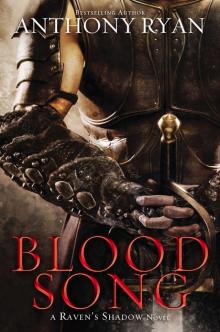 Blood Song
Blood Song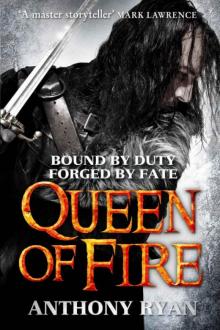 Queen of Fire
Queen of Fire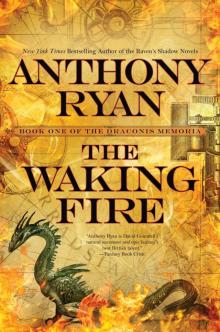 The Waking Fire
The Waking Fire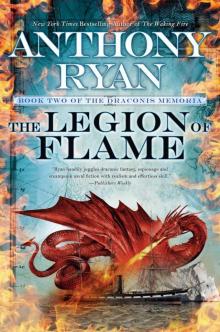 The Legion of Flame
The Legion of Flame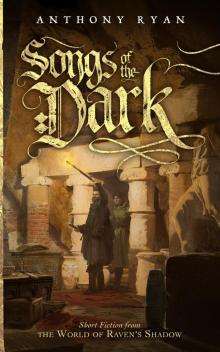 Songs of the Dark
Songs of the Dark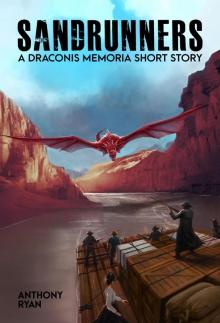 Sandrunners--A Draconis Memoria Short Story
Sandrunners--A Draconis Memoria Short Story Slab City Blues
Slab City Blues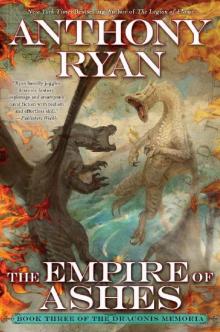 The Empire of Ashes
The Empire of Ashes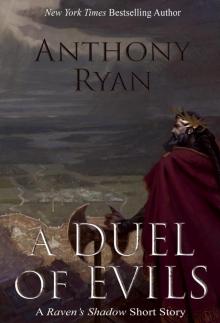 A Duel of Evils
A Duel of Evils The Pariah
The Pariah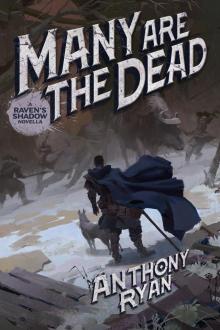 Many Are the Dead
Many Are the Dead The Wolf's Call
The Wolf's Call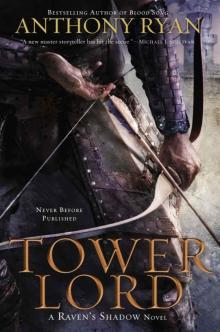 Tower Lord (A Raven's Shadow Novel)
Tower Lord (A Raven's Shadow Novel)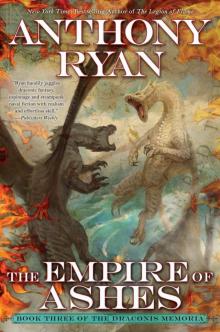 The Empire of Ashes (The Draconis Memoria)
The Empire of Ashes (The Draconis Memoria)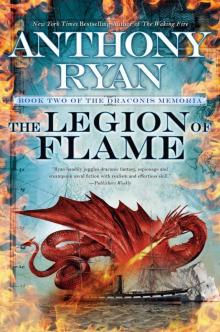 The Legion of Flame (The Draconis Memoria)
The Legion of Flame (The Draconis Memoria) Slab City Blues: A Song for Madame Choi
Slab City Blues: A Song for Madame Choi